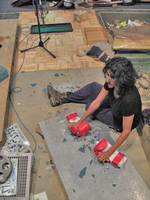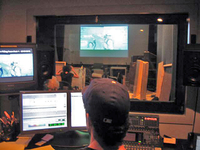 WOODY: Probably also with ProTools you have more and more tracks. Do you find that, too?
WOODY: Probably also with ProTools you have more and more tracks. Do you find that, too?
MONIQUE: Yes, absolutely. When there were less tracks, we also worked in pairs because that way you could double up on things. Double up on footsteps for crowd scenes, double up on props, like somebody would get one aspect of a sound while the other person would handle another. Say it was a dining room scene and if you have very few tracks you could have somebody doing chair creaks of people sitting at the dining room table while somebody else is handling glassware or dishes and you can do it simultaneously. Now, with so many tracks, you keep everything on it's own track. Which is good in some ways but also it's a lot more for the mixer to contend with.
WOODY: Do you generally work solo or in teams or both?
MONIQUE: Generally, I work solo. They still work in teams on the lots at Sony and Warner Bros., but it's getting to be less and less at your little boutique studios which is where I work. They tell me they don't have the budget and they don't see the value in having two people because they think that someone is just standing around, which isn't the case at all. It works really well to have two people doing Foley for a number of reasons. One is that somebody might be stronger at a certain thing than another.
I recently had to do a film where I had to walk Samuel L. Jackson, and I weigh about 120 pounds, and it's a struggle for me to sound like a plus 6-foot man. So if I had a partner that was maybe a bigger person, male or female, they might have been a little bit better at that. There were some things they did with the EQ and the way I physically hold my feet and do the steps and choices of shoes that help me, but the reality is in having a partner there's somebody who is going to be better at one thing or the other. And also it gives you a bit of a break from not having to do every single thing all the time.
WOODY: I've personally never recorded two Foley artists, but I've often thought that it could be a really creative atmosphere.
MONIQUE: Yeah. It's much more creative because two people, well I don't want to say two because whoever is recording the Foley has a very heavy influence on the creative process, so having three people in a room coming up with ideas is much better than just two.
WOODY: So you see the engineer as a partner in the collaboration of the Foley recording?
MONIQUE: Oh absolutely. I don't really know how to articulate how important the engineer is in the entire process. Usually we will have a discussion as to what we are going to cover first or what we think is the most important thing and we will do that first. Within a reel we won't necessarily go linearly. Because we are trying to budget time, we sort of pick what is the most interesting or what relates to the story. If there is something that is a really key prop that's used over and over and over again, then that's something that we really want to establish.
And sometimes we will record that in it's entirety throughout the film all at once for consistency's sake. I recently did a horror film where somebody spends a lot of time with a box over their head with a bunch of locks on it, which is not pleasant, I'm sure, for the person wearing the box. But anyhow, I could use that wood box with the latches that I have created for the sound, and if I do it over a period of days, I might change the way that I handle that particular prop. It might be rattling more one day than the other. So when it's something like that, we will usually record it all at once just so we get the same sound from it and that my interpretation doesn't change depending on my mood over the days.
 The recordist is huge, huge, huge -- on the level of morale for the space that's created because it is such an intimate space, especially if I'm working by myself and the person on the other side of the glass is my only contact. There have been many times that I have worked with people that have had such great, great, great ideas that I would not have come up with on my own, and together we build on each other's ideas and it is an amazing thing. Also, I don't always have the best judgment of how the sound is translating through the microphone. I can be thinking that something is just right on, and if I'm not working with somebody who is really skilled in that awareness of what is working and what's not, I'll go back and listen to what we have recorded and it's not so good.
The recordist is huge, huge, huge -- on the level of morale for the space that's created because it is such an intimate space, especially if I'm working by myself and the person on the other side of the glass is my only contact. There have been many times that I have worked with people that have had such great, great, great ideas that I would not have come up with on my own, and together we build on each other's ideas and it is an amazing thing. Also, I don't always have the best judgment of how the sound is translating through the microphone. I can be thinking that something is just right on, and if I'm not working with somebody who is really skilled in that awareness of what is working and what's not, I'll go back and listen to what we have recorded and it's not so good.
I can't always tell how the microphone is picking up what I'm doing and I heavily rely on the recordist's judgement. I work with a bunch of different types of engineers. Some are truly mixers and have taken it to an art form and EQ and modulate and do all sorts of things and others I work with just do straight recording, but are very picky about my interpretation of what I am doing. I've been really blessed and I have avoided situations where I would have to work with someone who either is unpleasant or lacks really, really great judgment. The people that I work with are really quite incredible.
WOODY: It's great to hear that you rely on a real collaboration with the engineer.
MONIQUE: It's more important than anything. It's more important than the props I have to use, it's more important than the stage I have to use, it's more important than the show I'm working on. I'd have to say it's singularly the most important thing.
